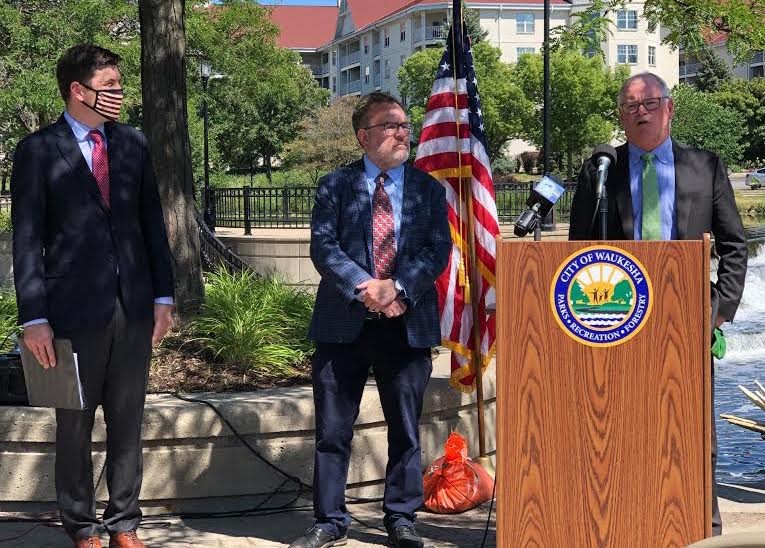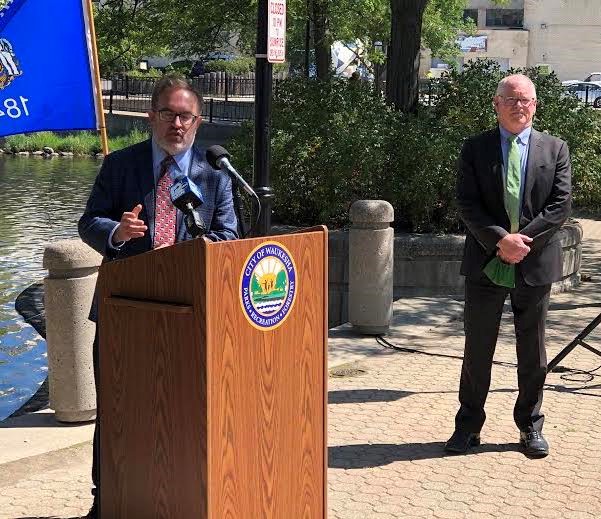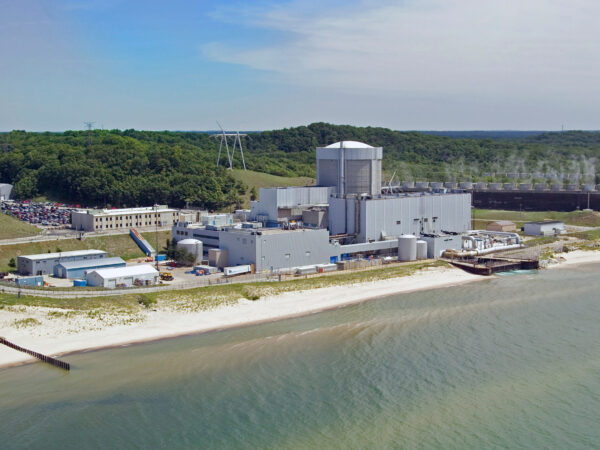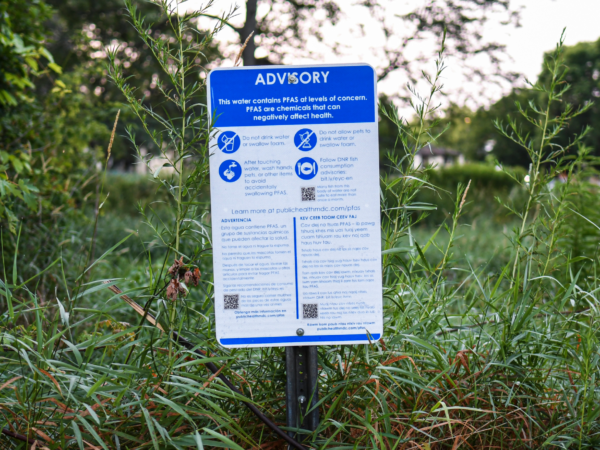
The city of Waukesha, Wisconsin, was recently awarded a $137.1 million dollar loan from the federal government for its construction project to switch the city’s municipal water source to Lake Michigan. Andrew Wheeler, administrator of the U.S. Environmental Protection Agency, announced the loan on August 12 in Waukesha alongside Mayor Shawn Reilly.
The Lake Michigan water supply project is a response to high levels of radium and depleted water levels in the aquifer that currently supplies Waukesha’s drinking water.
The city is currently under a court order to comply with radium standards by Sept. 1, 2023. To achieve this compliance, Waukesha is building a pipeline system to obtain an average of 8.2 million gallons of Lake Michigan water a day from Milwaukee and return the treated wastewater to the lake through the Root River.

Waukesha Mayor Shawn Reilly looks on as EPA Administrator Andrew Wheeler addresses the audience at the press conference announcing the WIFIA loan for the Waukesha Clean Water Project. (Photo courtesy of Great Water Alliance)
Past opposition to the project
The plan to divert water from Lake Michigan to Waukesha had initially proved controversial.
Waukesha sits in a county that straddles the Great Lakes basin and the Mississippi River basin, and by the terms of the 2008 Great Lakes Compact, such cities may apply to withdraw water from the Great Lakes. Waukesha was the first city to do so, and its proposal sparked opposition in the region.
The eight Great Lakes states unanimously approved Waukesha’s withdrawal in 2016, but members of the Great Lakes and St. Lawrence Cities Initiative, a group of U.S. and Canadian mayors, objected to the decision. They argued that the governors and Waukesha had not sufficiently considered water sources other than Lake Michigan and had tried to “shoehorn” Waukesha’s request into the terms of the compact. Mayors also were concerned about Waukesha using the diversion to expand its water service area, although Waukesha later cut back the proposed size of the service area.
In April 2017, the Compact Council of the eight governors’ representatives voted unanimously that there was no reason for the governors to reopen or modify their 2016 decision to allow the Waukesha diversion, and the mayors planned to sue the Compact Council in response.
They chose not to pursue the suit in August 2017 in exchange for working with an advisory committee to update procedures for considering future water divisions. The Compact Council ultimately rejected the proposed updates in December 2018.
In 2019, a separate controversy arose when the city of New Berlin opposed the construction of reservoirs and a pump station for the project. The initial plan was to build on part of a county park that fell within New Berlin, and the first approvals received unanimous support.
However, public pushback against building in the park persuaded elected officials in New Berlin to deny the conditional use permit. Waukesha initially filed a lawsuit but ended up negotiating a settlement by which New Berlin would pay $2 million to relocate the proposed facilities to Waukesha.
Loan terms lower cost to ratepayers
Waukesha applied over two years ago for the Water Infrastructure Finance and Innovation Act loan, a federal loan program established in 2014 and administered by the EPA for water and wastewater infrastructure projects.
“The politicians in this area, Sen. Baldwin, Sen. Johnson, Congressman Sensenbrenner, really assisted us — getting us to the right people, providing the support letters, making sure the federal government understood our case and how important this was for the residents, given we had to address this public health issue that we had in the city of Waukesha,” said Dan Duchniak, general manager of the Waukesha Water Utility.
To comply with the 2008 Great Lakes Compact, Waukesha must return 100% of the water it withdraws back to the lake. Meeting this term requires the construction of the return pipeline system in addition to the new water supply pipeline. The entire project is costly — the current estimate is $286 million — and water rates will need to increase to pay for it.
The loan offers significant cost savings for the people of Waukesha, Duchniak explained. The interest rate of 1.16% is much lower than the 3% the utility had expected when first applying for the loan, which will benefit ratepayers.
“The end result is that residents will save interest costs of about a million dollars per year,” Duchniak said.
The exact impact of the loan on rate increases is not yet known. The utility still needs to award three construction contracts, and the final cost of those will impact how much the rates need to go up.
But the alternative, if the WIFIA loan had not gone through, would have been to borrow money through a combination of general obligation debt and safe drinking water loans, federally subsidized low-interest loans that are paid back over 30 years.
“The interest rates for the safe drinking water loans are coming around 2%,” Duchniak said. “So the difference is significant in terms of interest rate.”
Waukesha ratepayers will benefit from the 38 year length of the repayment. The WIFIA program allows the utility to negotiate the repayment terms to work with any existing debt repayment plans. Waukesha can make lower payments for the WIFIA loan while the utility is still paying off loans from other infrastructure improvements, so the collective repayment costs are more consistent over time.
Project remains on schedule
In December 2019, the Wisconsin Department of Natural Resources finished its environmental impact statement for the proposed project and determined that it complied with the Wisconsin Environmental Policy Act. The DNR also issued a waterway and wetland permit for the pipeline construction and reissued the city’s wastewater permit with requirements for discharging treating wastewater into the Root River.
Nearly all of the state and federal permits have been issued, according to Duchniak.
“We are waiting for one construction authorization for the reservoirs and booster station in Waukesha from the Public Service Commission, which is our water regulatory agency in the state of Wisconsin,” Duchniak said. The need to change the site from New Berlin to Waukesha is why this permit is still outstanding, but Waukesha is currently having public hearings, including a virtual open house on Aug. 26 for residents in the neighborhood that the station will be built in, as part of the approval process.
A number of standard local construction permits also need to be applied for by the contractors, but the utility does not anticipate any problems in quickly obtaining those permits.
On June 2, the city of Waukesha awarded two bids for the construction of the return flow pipeline and one for return flow pump station, which collectively came in $20 million under budget. The construction process for the return flow pipeline began in August — pipeline isn’t in the ground yet, but the supplies are currently being acquired.
Construction bids for the water supply pipeline from Milwaukee to Waukesha were due Aug. 25 and will be awarded by Waukesha’s Common Council on Aug. 27 and the county on Sept. 1. Construction for those parts of the project is expected to begin late 2020 or early 2021. The water supply pump station will be bid out by the city of Milwaukee in October or November and awarded in late 2020 or early 2021. The reservoirs and booster station construction and the water tower construction will be bid out around the beginning of 2021 as well.
While the transition to virtual meetings during the pandemic has made public engagement and pre-bid meetings more challenging and caused some delays in regulatory approvals, overall COVID-19 has not slowed down the construction timeline.
“We’re addressing a public health issue here in the city of Waukesha too,” Duchniak said. “We’re under a court order to address the concern of radium in our water. So we need to push forward with all the tools we have available to us. We’ve pretty much kept on schedule for bidding, and we’re going to be able to move forward and meet our court order deadline.”
Read more on Waukesha on Great Lakes Now:
The impact of the Waukesha water withdrawal decision on Racine, WI
Great Lakes mayors drop legal threat on Waukesha diversion
Governors Greenlight Waukesha, Wisconsin for Lake Michigan water
New Scrutiny over Waukesha, Wisconsin’s Use of Lake Michigan Water
Featured image: Answering questions from the audience at the press conference announcing the WIFIA loan for the Waukesha Clean Water Project are Congressman Bryan Steil, EPA Administrator Andrew Wheeler and Waukesha Mayor Shawn Reilly. (Photo courtesy of Great Water Alliance)
1 Comment
-
Thank you for an excellent Article. The combination of historical backdrop and new WIFIA, low interest long-term financing tool is informative, particularly because of the nation’s water infrastructure crisis. I would have liked to know who loaned the money and received the governments-backed loan guarantees.




